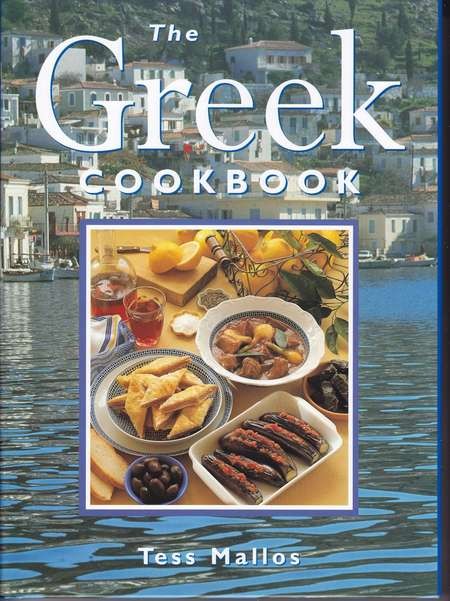The Greek Cookbook. Tess Mallos.

Author: Tess Mallos
When Published: 2012 (latest edition)
Publisher: Landsdowne Press
Available: From the Kytherian Association of Australia, Kathy Samios and George Poulos
Price: $30 (postage additional $10, within Australia)
Description: Hard Back 112 pages, magnificent recipes and photographs
ISBN: 1 86302 533 2
This best-selling cookbook contains all the delights of Greek cooking, and is enhanced by new photography to reflect the enduring Greek influence in the modern kitchen.
The authentic dishes have been compiled to satisfy the curiosity and taste buds of contemporary cooks, from beginners to gourmets. Well-known author Tess Mallos, who is intensely proud of her Greek heritage, has a gift for handing on the secrets of this wonderful cuisine in easy to follow recipes.
In the opening pages, A Cook's Eye View of Greece, with a regional map, gives a guide to the culinary focal points of Greece. The recipes that follow are not only delicious but good for you: research has proven that the Greek diet is the most healthy in the Mediterranean, (and the world).
The Greek Cookbook contains chapters on Appetizers, Soups, Sauces, Seafood, Meats, Poultry, Pasta and Rice, Vegetables, Salads, Pastries, Cakes, Cookies & Breads, Prerves, Wines and Spirits.
The revised text is enlivened by anecdotes and reminiscences from the author, and a a collection of sayings about food that go back to ancient Greece. this much-loved book is the key to enjoying the very best of Greek cuisine.

Tess Mallos
Tess Mallos was born of Greek parents who immigrated from the island of Kythera. Her love of Greek food goes back to her childhood, some time before such exotic dishes came to be appreciated by her contemporaries. Many of the anecdotes in this book give a humorous look at her early shyness about her culinary heritage.
She says of the days when she embarked on her food career, "I cooked Anglo recipes at the outset and then, when I decided to come out of the closet, it took six years before my Greek Cookbook was published. It sold out in two weeks!''
Since then Tess Mallos has travelled regularly and extensively in the Mediterranean and researched and written eight books, including The Complete Middle East Cookbook, also published by Lansdowne, which has sold 300,000 copies worldwide.
Other career highlights include consultant for a government body. major food manufacturers, and for Frigidaire. Tess has also appeared on a variety of television programs, and spoken at international symposiums and food products.
More than 35 years' experience have given an unrivalled authority to Tess's writing on food, and this collection of authentic and approachable recipes is especially dear to her heart.
INTRODUCTION
2012 Edition
It is heartening and flattering to know that this book has been constantly in print since it was first published, and still continues to be used by people of many backgrounds.
Greek cooking is treasured worldwide, and books now exist by many excellent authors, those of particular interest being works that explore the regional cooking of, Greece. But the crux of the matter is that there are still certain recipes that will always form the heart of Greek cooking as a whole, the ones prepared by most Greeks day-to-day. These recipes are all included in this book. For this new edition I have also added some new recipes, to reflect the wonderful range of food ingredients available today.
Australia, where I grew up and first prepared this book has some of the most interesting and varied foods in the world, and a developing cuisine of a very high standard. Those of Greek background in that country and elsewhere are as tempted to change their eating patterns as anyone else interested in good food. But there is a very good reason why people of Greek background should maintain their Greek kitchen, and that is good health. In fact everyone should look more closely at Greek cooking for the same reason.
Greeks in Greece, up until recent years, had the longest life expectancy in the world. Those in certain rural communities who have not changed their diet can still boast of longevity. The Greeks are the largest consumers of olive oil and vegetables in the Mediterranean, eat lots of bread, seafood’s, pulses and fresh fruit, and drink wine in moderation; such food habits have been identified as being beneficial to good health, as a preventative not only against heart disease, but also against certain cancers, adult-onset diabetes and strokes.
Health professionals have been studying the Greek diet for some years now comparing its success to that of other diets. The message is clear: if you are of Greek descent, eat as your parents or grandparents did when they were in Greece. Eat more bread, pasta, rice, seafood’s, vegetables, pulses and fresh fruit, cook leaner meats, continue to use olive oil, use less butter, serve cakes, pastries and similar foods less often.
To add a little spice to this book, I have included quotes, aphorisms, adages and a few of my experiences with food from my early years, growing up with a Greek kitchen in an Anglo society. Quotes from classical Greek writers give an insight into the foods and attitudes of Ancient Greece; it is unfortunate that many classical works, (including cookbooks) no longer exist in their entirety, but the excerpts quoted come from other works that still exist.
There are a number of people and organizations that gave assistance with the original work, and with this edition, to whom I am indebted. A heartfelt thank you to the Greek National Tourist organization for assistance given when this book was first written; the Economic and Commercial Office of the Greek Consulate in Australia, especially Mr Athanassios Makrandreou; Cosmo Psaltis of The Centennial Restaurant, Woollahra (featuring Mediterranean menus, including innovative Greek dishes), for updating information on Greek wines available outside Greece; Andrew Elton for his superb food photography, which could not have happened without the expertise of food stylist, Lynne Mullins (her work with fillo pastry is superb!); my editor first time round, Peter Hutton, and this time round, Cheryl Hingley - both showed an enthusiasm for Greek cooking that made my task easier; to Jane Curry, Publisher and Chief Executive of Lansdowne, for believing that this book was worthy of being included in their classic series, and her suggestion to include extra colour in the form of adages, quotes and other titbits (I have never read so many of the Greek classics in such a long stint); to my husband, John, and my sister, Ellen Argyriou, for their assistance and support.
And to many of you, in particular those of Greek descent or partners to those of Greek descent, who have let me know over the years how much the original book has helped you in the kitchen. I originally wrote this book so that my children, and yours, could learn Greek cooking, as our lifestyle today does not allow learning by constant observation. My grandchildren, even my grandson, show interest in Greek cooking in their tender years. I dedicate this edition to Stephanie and John, and to your grandchildren.
Tess Mallos
1997